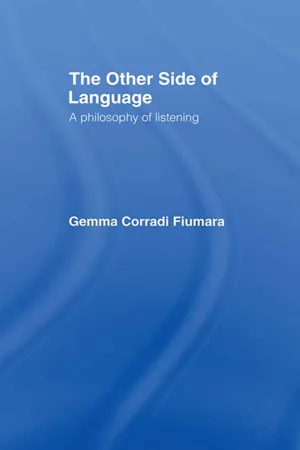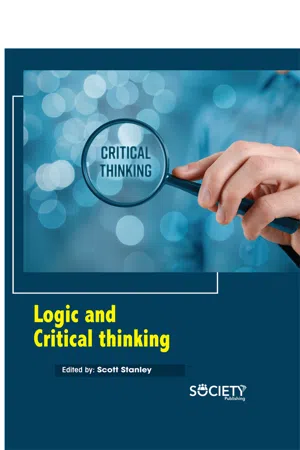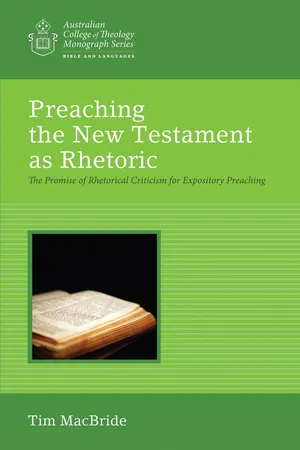Languages & Linguistics
Logos
Logos, in the context of languages and linguistics, refers to the rational principle that governs and gives meaning to speech and language. It encompasses the logical and persuasive aspects of communication, emphasizing the use of reasoning and evidence to convey a message effectively. In essence, logos is the appeal to logic and reason in language and communication.
Written by Perlego with AI-assistance
Related key terms
1 of 5
6 Key excerpts on "Logos"
- eBook - ePub
The Other Side of Language
A Philosophy of Listening
- Gemma Corradi Fiumara(Author)
- 2013(Publication Date)
- Routledge(Publisher)
There is a need, however, to look further into the possible ways of understanding such a pivotal word in the west as Logos. Perhaps we could start out by admitting that there could be no saying without hearing, no speaking which is not also an integral part of listening, no speech which is not somehow received. In view of the problems and contentions which can be encountered in research into the phylogenesis and ontogenesis of language we are inclined to believe that an individual can speak only if he is listened to, rather than there being something he might say that one would subsequently attend to ‘by means of’ listening. 4 The meaning the Greeks assigned to the word Logos has gradually gained worldwide acceptance, and whatever might have been passed down through the action word legein has been disregarded. This moulding, ordering sense of ‘saying’, in fact, has become drastically detached from the semantic richness of legein. Elevated to an essential principle of our culture, such a ruling set of meanings appears to control and shape all of our rational pursuits, and it is amazing that our culture can develop in association with such a limited, reduced-by-half concept of language. The tendency to constantly invoke dialogue in conjunction with this blind-spot on the issue of listening thus appears as a puzzling feature of our culture. As Heidegger points out: Language came to be represented – indeed first of all with the Greeks – as vocalisation, as sound and voice, hence phonetically… Language is a vocalisation which signifies something. This suggests that language attains at the outset that preponderant character which we designate with the name ‘expression’. This correct but externally contrived representation of language as ‘expression’, remains definitive from now on, It is still so today - eBook - PDF
- Rick Welch(Author)
- 2020(Publication Date)
- Peter Lang Group(Publisher)
He dubbed it Logos – which is usually capi- talized to accentuate its unique, all-embracing signification (analogous to the “Word” in the Christian Bible). The singular meaning of Logos was an ideal, not readily grasped by individuals, even in Heraclitus’ time. In one of the sur- viving fragments of Heraclitus’ own writings, we read (Fragment 1): “Of this Word’s [Logos] being forever do men prove to be uncomprehending, both before they hear and once they have heard it. For although all things happen according to this Word [Logos], they are like the unexperienced experiencing words and deeds such as I explain when I distinguish each thing according to its nature and show how it is. Other men are unaware of what they do when they are awake just as they are forgetful of what they do when they are asleep”; and in another fragment (Fragment 2): “Although this Word [Logos] is common, the many live as if they had a private understanding.” The later Greco-Roman philosopher, Plutarch (ca. 45-120 CE), would comment: “Heraclitus says there is a single common world for those who are awake, but each sleeper retires into a private world” (Graham, 2010). Guthrie (1962) presents a detailed discussion of the semantic portfolio of Logos around the time of Heraclitus onwards (from ca. 500 BCE into the fourth century BCE). The previous author lists the following specific usages (which we excerpt verbatim): 1) Anything said (or for that matter written)… An account of anything. A speech. Talk. 2) Mention in the sense of worth, esteem, reputation. 3) Taking thought… Holding a conversation with oneself. 4) The notion of cause, reason, or argument. 5) The truth of the matter. 6) Measure, full or due measure. 7) Correspondence, relation, proportion. What is a “word”? 75 8) General principle or rule. 9) The faculty of reason. 10) Definition, or formula, expressing the essential nature of anything. - eBook - ePub
- Richard C. Taylor, Luis Xavier López-Farjeat, Richard C. Taylor, Luis Xavier López-Farjeat(Authors)
- 2015(Publication Date)
- Routledge(Publisher)
Part II Logic, Language, and the Structure of SciencePassage contains an image 6 Logic and Language Thérèse-Anne Druart Introduction
In Greek Logos, word or discourse, gave rise to logike techne or craft of reasoning, i.e. logic. Further, the basic type of reasoning studied in logic is called the syllogismos, a word deriving from Logos. These etymologies reveal a link between language and logic, particularly since symbolic logic was not yet invented. Classical Arabic too manifests a link between word or speech and logic as the word for logic mantiq derives from nutq, which means articulated speech. Yet, logic claims to be universal, whereas there is a great multiplicity of languages. Distinguishing logic from linguistic arts, as well as articulating their relationship, is a complex and difficult endeavor that philosophers in Islamic lands faced in various ways. They had to take into account not only the Greek philosophical tradition but also some theological positions. In the first section I look at logic as essentially an autonomous discipline focusing on syllogisms. In the second I explore how some philosophers either emphasize their relationship or try to articulate better logic’s autonomy. The last and final section deals with some of the philosophers’ reflections on various aspects of language in general.LogicFor a long time the pioneering work of N. Rescher (1963, 1964) was our main source of information for the History of Arabic logic during the classical period. More recently the edition of various logical texts has led to interesting developments. Detailed studies on Arabic syllogistic in the Aristotelian tradition have come out (Black 1990; Lameer 1994, 1996; and Street 2004, 2008). In addition, Street & El-Rouayheb (2004, 2005, 2010) have begun to explore developments beyond the classical period, particularly those occurring in the madrasa - eBook - PDF
- Scott Stanley(Author)
- 2020(Publication Date)
- Society Publishing(Publisher)
Logic and Language Chapter 4 LEARNING OBJECTIVES In this chapter, students will get to learn about: ● The meaning of Philosophy of language; ● Logic related to cognitive and emotive meaning; ● what is definition? ● Types and Purpose of definition in context of logic; ● Different techniques related to definition; ● Rules or criteria related to lexical definition. Logic and Critical Thinking 88 Keywords: Cognitive meaning , Definition, Denotative definition, Emotive meaning, Intentional meaning, Lexical definition, Philosophy of language 4.1. INTRODUCTION It is not possible to define the concept of language in a single expression because it is too broad to be defined. It is required to describe and make clear the concept in the initial stages and the reason is that it sits at the heart of the philosophy of language. Generally, the languages are the forms of the symbolic representation. There are certain symbols which are used in order to represent the meaning of certain words. The definition can be used for the formal languages and also for natural languages. The language is used for speaking, writing, listening, and reading and this is a skill for humans. Therefore, human language cannot be considered without people and using, creating, developing, and changing it by the people. The language is said to be a tool for people in order to share ideas, feelings, and desires. It helps in revealing the thoughts and further communicating with others. In order to transmit knowledge, one of the most developed and complicated means is human language. Language is considered to be a must for poetry, prose, and drama. This is what makes a community out of a group of people. Language can be defined as a unity of multidimensional concepts which is made up of accidental signs and also, is a system which provides communication (İmer et al., 2013, 87). While considering the definition, it can be said that an object cannot be named by using the sign table. - eBook - ePub
Preaching the New Testament as Rhetoric
The Promise of Rhetorical Criticism for Expository Preaching
- MacBride(Author)
- 2014(Publication Date)
- Wipf and Stock(Publisher)
8Logos : Rational Argument
The final type of proof to which we now turn is that which receives the most attention in the handbooks: Logos , the use of rational argument. This is described by Aristotle as “the proof, or apparent proof, provided by the words of the speech itself,”691 the goal of which is to prove “what is not certain by means of what is certain.”692 Although such arguments can be found anywhere throughout the speech, they are found most frequently in the “proof” section (pistis , probatio , or confirmatio ). The writer to Herennius describes it as “the presentation of our arguments, together with their corroboration,”693 while the writer to Alexander refers to it as the process of “adducing proofs and by considerations of justice and expediency.”694 In other words, Logos is the mode of persuasion by which the propositio is defended by rational argument.Aristotle divided these arguments into two kinds: those constructed by the speaker himself (which he termed entechnos , or “artificial”), and those which are provided externally (atechnos , or “inartificial”):By the latter I understand all those which have not been furnished by ourselves but were already in existence, such as witnesses, tortures, contracts, and the like; by the former, all that can be constructed by system and by our own efforts. Thus we have only to make use of the latter, whereas we must invent the former.695A few centuries later, Quintilian affirmed Aristotle’s division as being “met with almost universal approval.”696 We will thus examine Logos - eBook - PDF
- Omer Aygun(Author)
- 2016(Publication Date)
- Northwestern University Press(Publisher)
Te possibility of truth and falsity appears as the central factor of speech. Tus, the “fnal cause” of the frst articulation of speech points to the second level of articulation. “Letters,” however functional, were not meaningful in themselves; nouns, in turn, however meaningful, are not ends in themselves. Tus we come to the most common meaning of Logos as speech: Logos apophantikos or “declarative sentence.” We saw Aristotle’s defnition: “ Logos is a signifying voice, one of whose parts is signifying separately, not as an 168 chapter 6 afrmation, but as an expression.” 80 Logos has a meaningful part, but this second level of articulation also relates that independently meaningful part to that which applies and does not apply to it ( hyparkhein ) with temporal specifcation. 81 In the frst case, indeed, the declarative sentence is afrma-tion ( kataphasis ), in the second, it is negation ( apophasis ): “Afrmation is a declaration of something concerning something [ kata tinos ], whereas nega-tion is a declaration of something against something [ apo tinos ].” 82 Te duality of afrmation and negation is explained by the duality of truth and falsity, and this latter by the truth of the principle of non-contradiction: concerning the very same subject matter, a declarative sentence is necessarily open to both truth and falsity. Terefore any such sentence can be negated. Here we see that truth or falsity, the radical breakthrough out of voice into speech, puts at work that which was potential in expression: “Socrates is exe-cuted” is not simply an expression of something (“Socrates”), but an expression of something about it. But what? Te declarative sentence enjoys a “freedom” that is almost as unlimited, a “freedom” that extends far beyond the unique “correct” match, and is entangled in the myriads of ways of being “incorrect.” Tis is why such correctness is not a fact, but an issue.
Index pages curate the most relevant extracts from our library of academic textbooks. They’ve been created using an in-house natural language model (NLM), each adding context and meaning to key research topics.





